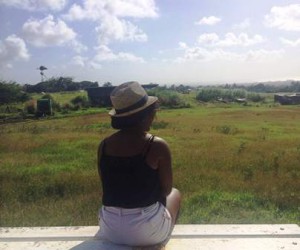
Submitted by Ayanna Gill on the 2015 winter session program in Barbados sponsored by the Department of Human Development and Family Studies and the Department of Hotel, Restaurant, and Institutional Management…
Before traveling to Barbados, I watched this beautiful TED Talk by Pico Iyer titled “Where is Home?” Pico Iyer paints a wonderfully touching picture on what it means to be at home in a world where our origins are that of cultural mashups.
Home is a very difficult word to conceptualize in this day and age. To me, home is a sanctuary, a place of love and comfort that always welcomes you with open arms; where the rags of your life are turned into quilts. For many people, home is a connector to where you are from, where you are born or raised and educated. But, for more and more of us in this generation, “home has less to do with a piece of soil that we walk on than a piece of our soul”. A strong point that really resonated with me about his speech was the idea that people today take pieces of many different places and put them together into a stained glass whole. Home is considered a work in progress, it’s like a project on which we are constantly adding upgrades, corrections and improvements. This point really hit for me because it explains why so many people in this world travel regularly, stay in different parts of the world for extended periods of time and call it home. It’s the idea of where you are coming from is less important than where you are going.
In many ways, my journey to Barbados was a search for my extended family and I found them. Ever since I was a little girl going with my parents to the hospital to visit my Grandmother Gill and listening to the beautifully articulated stories of my Great Aunt Iris, I have only been exposed to bits and pieces of my family story. Yet, I have never known the real roots of my family tree. “Where am I from?” I have always known that I have had a connection to Barbados. My Aunt Iris moved to New York from Barbados and lived to be 105 years old. I loved listening to her stories of growing up on the island and the major historical events she lived through upon moving to America. I met family from Barbados, the cousins of my father, but I was still confused by our relationship. “Was this really family?”
I knew I wanted answers and seeking the truth was exactly what I wanted to do once I arrived in Barbados. On Tuesday, January 20th, 2015 I found what I was looking for in the most shocking way. My grandfather and father extended the contact of my cousin on the island and I finally met him. Cousin Roger was his name. He had been putting together the family tree on my father’s side for a few years now, piecing together birth certificates and records until he finally had a physical family tree. I wanted to cry. The emotions that I was feeling were a rush of excitement, of years of hearing stories, but still longing for more about who I was and where my family came from. My cousin was able to piece together our family tree spanning back to the 1800s and how our family started in Barbados.
It all began with Horatio Rawlins–my great, great, great, great grandfather, a white plantation owner for one of the biggest plantations on the island in St. Philips. His daughter, Eva Ann, married a black slave on the plantation, who was a bookkeeper named Samuel Thorpe. Horatio Rawlins gave them a portion of the plantation to live on. Eva Ann and Samuel Thorpe had five children, one of them being my great, great grandfather Percival Thorpe. Percival Thorpe had my great grandmother Margorie Gill. My biggest surprise was just the idea that my family has a connection to one of the biggest, original plantations on the island. This is the same plantation I took a tour of in the first week of being here, the one that is now being used as a tourist attraction site, the same one that has been passed down for generations by families with money to claim the land. My cousin could tell the level of shock in my reaction to this information and he continued to reassure me that Barbados is my home, “you will always have family here.” It’s still taking me time to process all this information of my story. Telling my Dad and hearing his surprise over the phone–all I could do was tear up.
“Am I finding my home?”


